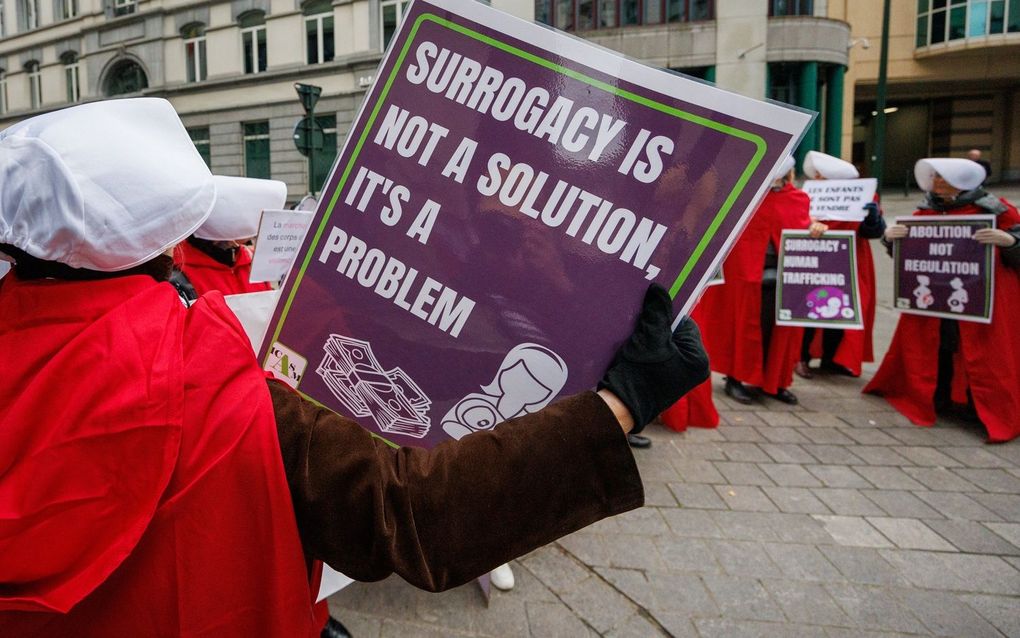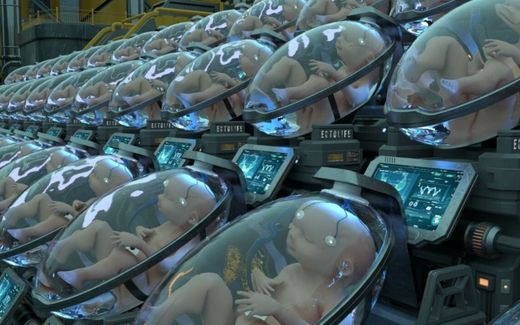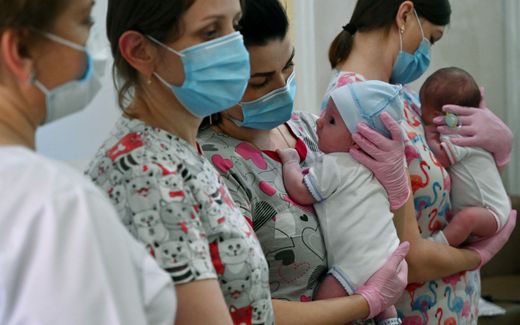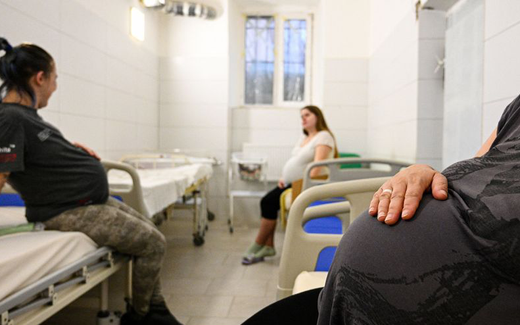Women and wombs are not for sale, says German author Birgit Kelle
07-08-2025
Central Europe
Birgit Kelle

Women Against Surrogacy Belgium protest against the 'Men Having Babies' gathering in Brussels, Belgium. The American 'Men Having Babies' organisation travels annually to the heart of Europe to attract clients, primarily focusing on single and homosexual men from countries where surrogacy is not allowed. Photo EPA, Olivier Matthys
Central Europe
If we’re already ‘renting’ wombs for surrogacy, why not take it a step further? Brain-dead women can carry pregnancies and give birth. We will just call it “whole-body donation” and create incubators for reproduction. The German author Birgit Kelle explains why this is the logical next step (but indeed, in the wrong direction).
Brain-dead women are ideal in many ways: they do not object, nor need to be paid. Also, they can undergo more dangerous procedures to increase the chances of birth, and up to four embryos can be implanted at the same time. If they miscarry or some of the embryos have to be “reduced” due to illness or the wrong sex, it doesn’t matter to them at all, because these women are already legally and medically dead and are only being kept alive by machines.
An artificially ventilated and fed baby-making machine. There’s no need to invent the artificial incubator; it already exists. How wonderful a woman’s body can still be useful even after her death.
The whole thing will also become much fairer from a feminist perspective, because in the near future, it will probably also be possible to use brain-dead men as baby-making machines. Three cheers for transplant medicine, which is now working on transplanting entire wombs not only successfully into women, but soon also into men’s bodies. This would finally bring about reproductive justice, and the tiresome work of reproduction would no longer be left to women alone.
Gender parity in the delivery room at last. This proposal by British philosophy professor Anna Smajdor, who teaches medical ethics at the University of Oslo, caused an outcry in the global debate on surrogacy at the beginning of 2023, at least among those who did not understand the detailed article published in a renowned specialist magazine.
How long can you actually keep a brain-dead body alive with machines and keep fertilising it over and over again? How many egg donations can you take from her?
Kids for money
For many years, a sticker with the text “Women are not for sale” has been stuck on the glass recycling bin where I dispose of my empty bottles. It was obviously placed there because the container is within sight of the local brothel. By the way, this brothel is now called a sauna club because the 100 ladies are no longer called whores, but sex workers. They still do the same work, but it’s called something else now.
Whereas it used to “only” be possible to hire their sexuality as a service by the hour, it is now possible to buy their fertility for nine months.
However, there are new ways to exploit women nowadays. Advances in reproductive medicine have now catapulted women into a new era of physical abuse. Whereas it used to “only” be possible to hire their sexuality as a service by the hour, it is now possible to buy their fertility for nine months. So-called “surrogate motherhood” is becoming a modern form of prostitution in the 21st century.
Now it’s not just about sex for money, but also about kids for money. The principle is still the same: it’s never about the woman as a human being, but only about her body and how it can be used. It is dehumanising to no longer view a woman as a whole person, with a body, mind, and soul, but only to evaluate her individual body parts and their flawless functionality.
Conventional prostitution is, to put it bluntly, the use of a woman’s body for personal sexual gratification; after all, you paid for it. “Surrogate motherhood” is the use of women as baby-making machines. This is yet another step down the ladder of degradation. Women are used as tools, like brood mares, for the reproductive desires of strangers.
It’s just a tiny mental step from “uterus” to “birth machine.”
We are simply looking at a new form of female exploitation using a well-known methodology. And as with “sex workers” worldwide, we are once again being told that women do all this voluntarily and of their own free will, that it is an honourable profession that should not be stigmatised, a job that should be legally and decently paid because otherwise it immediately loses its potential for exploitation. And of course, this requires a pimp –pardon me– an agent who takes care of everything and then collects the money.
To keep the business running smoothly, you also need a policy that legalises it, poster women who publicly praise it and talk about their great earning potential, a few naive feminists who welcome the whole thing as liberation from the burden of motherhood, and a few doctors who want to make a lot of money. The modern brothel of fertility prostitution is a gynaecological practice.
The mother must go
The word “mother” is, of course, very problematic in this context, as it reminds us all, at best, of warmth, closeness, childhood, and security. Mum means dried tears and plasters on scraped knees and broken hearts. The word mother is unacceptable if you prefer not to talk about the emotional and unique relationship between a child and the woman in whose womb each of us once grew up. A mother can be important, loved, and missed by the child who is willing to betray her for the very same reason.
The mother must go — out of the language, out of sight, and out of the mind. The linguistic elimination of the woman and mother is essential to sweep away ethical concerns about a medical practice that are undoubtedly present not only among critics but also among users of “surrogacy.”
The German language manages to gloss over this brilliantly, simply by inventing the term “borrowed motherhood” (“Leihmutterschaft”). Renting a mother — it sounds harmless and still radiates the residual warmth of childhood days, while at the same time describing a woman who is by no means supposed to be a “mother,” but only a breeder, a tool, a machine that spits out the finished product, the child, and is then no longer needed. The emphasis on “voluntariness” and “altruism” also belongs to this group of terms.
Isn’t she wonderful, this surrogate mother who can’t wait to help a stranger achieve parental bliss devotedly? But please, no sentimentality here; serious business is at stake.
Motherhood is now a surrogate.
War is peace, freedom is slavery, ignorance is strength, and, to paraphrase George Orwell, motherhood is now a surrogate.
After decades of feminist struggle to make women visible in language, they are now being made invisible again in the name of gender equality. It says a lot about a society’s view of women when it is willing to erase women and mothers from thought and language to reduce them to a bodily function.
What is a mother?
Those who can no longer define what a woman is cannot define what a mother is either. If every person can be a woman, then anyone can be a mother of a child — even a man.
We cannot ban biology, but we can ignore it linguistically because we feel discriminated against by the natural facts. A woman is suddenly no longer a woman, but only a body with various sex organs within the human species, literally, for example, a “vulva owner” – as if she carried her vagina around in a handbag. In 2021, The Lancet journal referred to “people with periods,” while elsewhere women were called “menstruators,” “uterus havers,” “people with egg cells,” and in the delivery room, not mothers, but “birthing persons,” since, after all, “male-read persons” also have children today. The term “non-male” to describe women is also wonderful.
The surrogate does not become the mother, but the clients become the parents.
The man is analogously referred to as a “penis bearer,” a “person with sperm,” and in the end even a “woman with a penis,” because the most zealous players in this game now want to convince us that the penis is no longer a typically male sexual organ, but only a socially attributed trait of masculinity. In return, women now only have a front hole instead of a vagina and, compared to men, only have a bonus hole, i.e., an “additional hole,” in order to take the linguistic repugnance of describing a woman’s body based on the number of her orifices to an absolute low point in the name of trans-sensitive language.
From person to function
Once women have been reduced linguistically to mere owners of organs and bodily functions, it becomes much easier to describe mothers as functional processes rather than human beings. The mother turns into a “birther,” a “postpartum individual,” or even a “postnatal person.” The breastfeeding mother becomes a “breastfeeding person,” a “lactating individual” who feeds not breast milk, but “human milk” or “parent milk” (parent’s milk), for which she does not use her breasts, but her “mammary tissues” or her “lactating glands.”
Similarly, the reproductive medicine industry is very creative in its efforts to eliminate the image of the pregnant mother from the minds of customers and the brochures of glossy clinics. The English language has always been much more honest about this. “Rent a womb” was the term used from the outset. The globally used medical term “surrogacy” also describes it without embellishment.
The German dictionary Duden defines a surrogate as an incomplete replacement. The pregnant woman as a replacement object – how fitting. Even on the official website of the Scottish government, the information pages on surrogacy completely avoid the term “mother”: “A ‘surrogate’ is someone who will have a baby for you. If you use a surrogate, you would be known as an ‘intended parent’ or ‘intended parents’.” The surrogate does not become the mother, but the clients become the parents.
De-mothering
The most common term for a surrogate mother is now gestational surrogate or gestational carrier, or simply the carrier.
This word is used in English to refer to aircraft carriers, shipping companies, and transport companies, as well as backpacks, and in medicine to refer to the carrier of a virus, while the woman carries the pregnancy and delivers the child.
Gestation is the medical term for the entire process of carrying a child; a pregnancy is “carried out.” The gestational surrogate is literally the substitute carrier. Some people deliver mail, others deliver children. Delivered as ordered!
After the linguistic elimination of the mother, the legal elimination follows almost logically.
Why not just say “pregnancy” like with any other pregnant woman? It’s quite simple: using clinical terms helps create emotional distance. Pregnancy means “being with child,” a “mother-to-be” in “joyful anticipation” of her child. The gestational carrier is not supposed to be happy; she is supposed to deliver according to the contract.
The surrogacy agency Success simply refers to the legal process of transferring parental rights from the birth mother to the intended parents as “de-mothering.” And that’s what it is.
After the linguistic elimination of the mother, the legal elimination follows almost logically, with her autonomy in relation to fertilisation, pregnancy, birth, and parental rights being regulated by contract.
A new belly
Men who raise their children completely without women often emphasise the irrelevance of mothers. “Of course, she’s the woman who gave birth to the children, but she’s not the mother. She helped us have the children,” says one of the fathers in the WDR documentary Leihmutter, Eimutter und zwei Väter (Surrogate Mother, Egg Mother and Two Fathers). On the British BBC, two gay fathers, Marc and Chris, complain about the incorrect terminology when others kept asking, “How is the mother doing?” Marc answers: “It’s called surrogate, not mother.”
In Canada, the surrogate mother of a gay couple known from TV, who sold their “surrogate journey” as a reality show entitled Flipping Out, refused to continue participating after the birth and sued the two men, Jeff and Gage, for violation of her personal rights and public humiliation. She had also been filmed during the birth, against her will.
Jeff and Gage are now divorced and have been embroiled in a custody battle over their four-year-old daughter, Monroe, for years. Jeff still has embryos in the freezer and is now looking for a new incubator. He fired the first woman because she had a miscarriage – he always has trouble with women. “I need another womb,” he announced in the media.
A feminist disaster
Given the disgraceful facts surrounding this business, “surrogacy” is, from a feminist point of view, an absolute distaste.
Unfortunately, not everyone will admit this, as they have manoeuvred themselves into an argumentative dead end. They celebrated the achievements of reproductive medicine for the pill and abortion – now they don’t know how to speak up when women are exploited in the name of the same medicine. Think about:
You stand for the colourful diversity of family forms – what do you say when single men order children and declare mothers irrelevant?
You fight against the stigmatisation of prostitutes and promote them as sex workers – what do you say when reproductive workers are now exploited.
It is perhaps the most perfidious form of exploitation when the customer is morally upgraded if he does not pay, and the worker is condemned if she demands wages.
Last but not least, the debate about whether surrogacy should or can be altruistic or commercial is absurd, not only from a moral point of view, but also from a feminist perspective. The argument for legalising non-commercial variants always invokes the image of the devoted woman with no financial interest whatsoever, nor should she be allowed to have any, because she does everything out of pure human kindness and a desire to give birth.
Let’s leave aside for a moment the fact that alleged altruism in this profession is, as we have already seen, usually a lie and a deception. Money usually changes hands, and even if we disregard that, it doesn’t make it any better.
In that case, the decent woman is not allowed to want any remuneration for her reproductive work; according to Marx, she should freely consent to her own exploitation as a worker in order not to morally discredit her own actions. It is perhaps the most perfidious form of exploitation when the customer is morally upgraded if he does not pay, and the worker is condemned if she demands wages, while, of course, the agency, the laboratory, the clinic, and the reproductive doctor continue to receive their wages, because after all, they have provided a service. Not only is the woman exploited, but they also want to rip her off.
In the context of wage justice, the altruistic variant becomes a gender pay gap of apocalyptic proportions, because the woman who takes all the physical and emotional risks does not receive a penny, while everyone else involved in the process profits, and the customer even receives a gift. So the unpaid reproductive worker is supposed to be happy to do it so that the others don’t feel bad about using her body.
How much is the woman’s “own fault”?
So, a strange paradox has emerged: on the one hand, today’s feminist discourse argues that women are not, after all, the birthing machines of men in society. That is why we have been fighting for a long time for the right not to have to give birth, for contraception and abortion to be legally accessible and, ideally, covered by health insurance.
At the same time, women also participate in the exploitation of other women when they themselves are unable to bear children or are no longer able to do so because they did not want a child for half their lives. The “right not to have children” suddenly becomes a call for the “right to have children.”
The same society, the same legislators, and the same health insurance companies that were previously appropriated to ensure one’s own childlessness are now supposed to enable one’s own fertility and motherhood and, once the biological train has left the station, morally and legally support the desire to have children, and, if possible, even finance it through health insurance.
But are we still talking about childlessness as a tragic fate when people have deliberately allowed their own fertility to pass? How much personal responsibility must those women and men who have voluntarily chosen to live without children for decades take? It is no coincidence that egg freezing, known as “social freezing,” is now being offered free of charge to female employees in Silicon Valley, as a generous employer benefit. Employers do not act selflessly, but according to the rules of profit maximisation.
Is it stupidity or naivety that the feminist movement is allowing its hard-won autonomy in this matter to be snatched away from it, once again under the guise of liberation from the constraints of biology? Worse still, this last female domain is being taken over by men, who have turned the desire to have children into a business model based on the exploitation of women.
This article is a summarised translation of a chapter from the German book “I buy myself a child”(“Ich kauf mir eind Kind”) written by Birgit Kelle in 2024, FinanzBuch Verlag, Munich.
Related Articles













